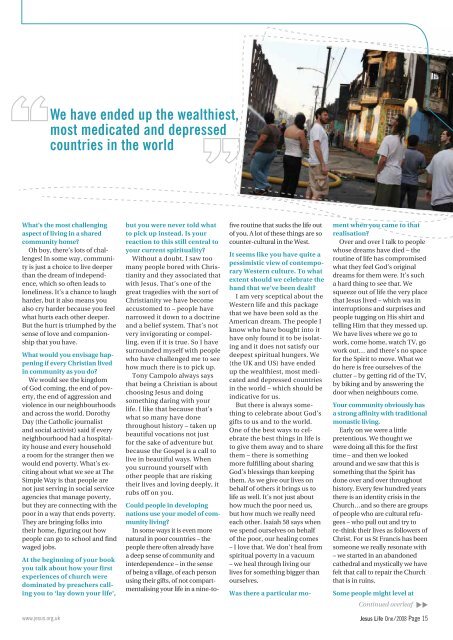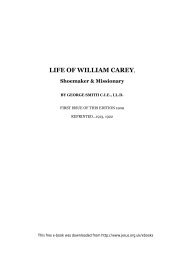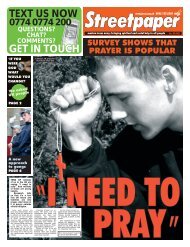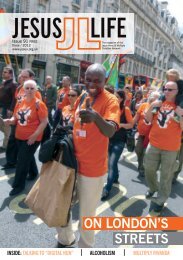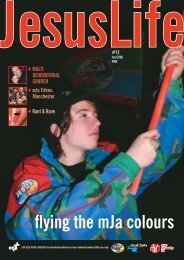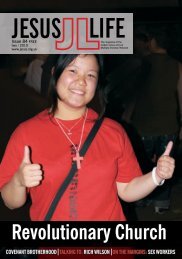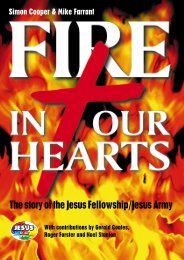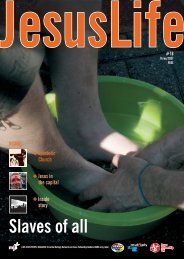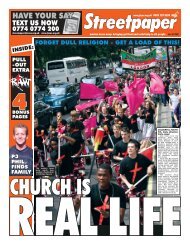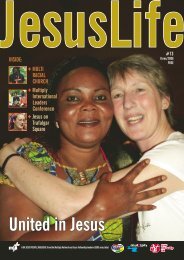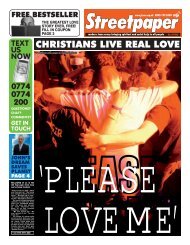Church of the poor - Jesus Army
Church of the poor - Jesus Army
Church of the poor - Jesus Army
Create successful ePaper yourself
Turn your PDF publications into a flip-book with our unique Google optimized e-Paper software.
www.jesus.org.uk<br />
We have ended up <strong>the</strong> wealthiest,<br />
most medicated and depressed<br />
”<br />
countries in <strong>the</strong> world<br />
“What’s <strong>the</strong> most challenging<br />
aspect <strong>of</strong> living in a shared<br />
community home?<br />
Oh boy, <strong>the</strong>re’s lots <strong>of</strong> challenges!<br />
In some way, community<br />
is just a choice to live deeper<br />
than <strong>the</strong> dream <strong>of</strong> independence,<br />
which so <strong>of</strong>ten leads to<br />
loneliness. It’s a chance to laugh<br />
harder, but it also means you<br />
also cry harder because you feel<br />
what hurts each o<strong>the</strong>r deeper.<br />
But <strong>the</strong> hurt is triumphed by <strong>the</strong><br />
sense <strong>of</strong> love and companionship<br />
that you have.<br />
What would you envisage happening<br />
if every Christian lived<br />
in community as you do?<br />
We would see <strong>the</strong> kingdom<br />
<strong>of</strong> God coming, <strong>the</strong> end <strong>of</strong> poverty,<br />
<strong>the</strong> end <strong>of</strong> aggression and<br />
violence in our neighbourhoods<br />
and across <strong>the</strong> world. Dorothy<br />
Day (<strong>the</strong> Catholic journalist<br />
and social activist) said if every<br />
neighbourhood had a hospitality<br />
house and every household<br />
a room for <strong>the</strong> stranger <strong>the</strong>n we<br />
would end poverty. What’s exciting<br />
about what we see at The<br />
Simple Way is that people are<br />
not just serving in social service<br />
agencies that manage poverty,<br />
but <strong>the</strong>y are connecting with <strong>the</strong><br />
<strong>poor</strong> in a way that ends poverty.<br />
They are bringing folks into<br />
<strong>the</strong>ir home, figuring out how<br />
people can go to school and find<br />
waged jobs.<br />
At <strong>the</strong> beginning <strong>of</strong> your book<br />
you talk about how your first<br />
experiences <strong>of</strong> church were<br />
dominated by preachers calling<br />
you to ‘lay down your life’,<br />
but you were never told what<br />
to pick up instead. Is your<br />
reaction to this still central to<br />
your current spirituality?<br />
Without a doubt. I saw too<br />
many people bored with Christianity<br />
and <strong>the</strong>y associated that<br />
with <strong>Jesus</strong>. That’s one <strong>of</strong> <strong>the</strong><br />
great tragedies with <strong>the</strong> sort <strong>of</strong><br />
Christianity we have become<br />
accustomed to – people have<br />
narrowed it down to a doctrine<br />
and a belief system. That’s not<br />
very invigorating or compelling,<br />
even if it is true. So I have<br />
surrounded myself with people<br />
who have challenged me to see<br />
how much <strong>the</strong>re is to pick up.<br />
Tony Campolo always says<br />
that being a Christian is about<br />
choosing <strong>Jesus</strong> and doing<br />
something daring with your<br />
life. I like that because that’s<br />
what so many have done<br />
throughout history – taken up<br />
beautiful vocations not just<br />
for <strong>the</strong> sake <strong>of</strong> adventure but<br />
because <strong>the</strong> Gospel is a call to<br />
live in beautiful ways. When<br />
you surround yourself with<br />
o<strong>the</strong>r people that are risking<br />
<strong>the</strong>ir lives and loving deeply, it<br />
rubs <strong>of</strong>f on you.<br />
Could people in developing<br />
nations use your model <strong>of</strong> community<br />
living?<br />
In some ways it is even more<br />
natural in <strong>poor</strong> countries – <strong>the</strong><br />
people <strong>the</strong>re <strong>of</strong>ten already have<br />
a deep sense <strong>of</strong> community and<br />
interdependence – in <strong>the</strong> sense<br />
<strong>of</strong> being a village, <strong>of</strong> each person<br />
using <strong>the</strong>ir gifts, <strong>of</strong> not compartmentalising<br />
your life in a nine-t<strong>of</strong>ive<br />
routine that sucks <strong>the</strong> life out<br />
<strong>of</strong> you. A lot <strong>of</strong> <strong>the</strong>se things are so<br />
counter-cultural in <strong>the</strong> West.<br />
It seems like you have quite a<br />
pessimistic view <strong>of</strong> contemporary<br />
Western culture. To what<br />
extent should we celebrate <strong>the</strong><br />
hand that we’ve been dealt?<br />
I am very sceptical about <strong>the</strong><br />
Western life and this package<br />
that we have been sold as <strong>the</strong><br />
American dream. The people I<br />
know who have bought into it<br />
have only found it to be isolating<br />
and it does not satisfy our<br />
deepest spiritual hungers. We<br />
(<strong>the</strong> UK and US) have ended<br />
up <strong>the</strong> wealthiest, most medicated<br />
and depressed countries<br />
in <strong>the</strong> world – which should be<br />
indicative for us.<br />
But <strong>the</strong>re is always something<br />
to celebrate about God’s<br />
gifts to us and to <strong>the</strong> world.<br />
One <strong>of</strong> <strong>the</strong> best ways to celebrate<br />
<strong>the</strong> best things in life is<br />
to give <strong>the</strong>m away and to share<br />
<strong>the</strong>m – <strong>the</strong>re is something<br />
more fulfilling about sharing<br />
God’s blessings than keeping<br />
<strong>the</strong>m. As we give our lives on<br />
behalf <strong>of</strong> o<strong>the</strong>rs it brings us to<br />
life as well. It’s not just about<br />
how much <strong>the</strong> <strong>poor</strong> need us,<br />
but how much we really need<br />
each o<strong>the</strong>r. Isaiah 58 says when<br />
we spend ourselves on behalf<br />
<strong>of</strong> <strong>the</strong> <strong>poor</strong>, our healing comes<br />
– I love that. We don’t heal from<br />
spiritual poverty in a vacuum<br />
– we heal through living our<br />
lives for something bigger than<br />
ourselves.<br />
Was <strong>the</strong>re a particular moment<br />
when you came to that<br />
realisation?<br />
Over and over I talk to people<br />
whose dreams have died – <strong>the</strong><br />
routine <strong>of</strong> life has compromised<br />
what <strong>the</strong>y feel God’s original<br />
dreams for <strong>the</strong>m were. It’s such<br />
a hard thing to see that. We<br />
squeeze out <strong>of</strong> life <strong>the</strong> very place<br />
that <strong>Jesus</strong> lived – which was in<br />
interruptions and surprises and<br />
people tugging on His shirt and<br />
telling Him that <strong>the</strong>y messed up.<br />
We have lives where we go to<br />
work, come home, watch TV, go<br />
work out… and <strong>the</strong>re’s no space<br />
for <strong>the</strong> Spirit to move. What we<br />
do here is free ourselves <strong>of</strong> <strong>the</strong><br />
clutter – by getting rid <strong>of</strong> <strong>the</strong> TV,<br />
by biking and by answering <strong>the</strong><br />
door when neighbours come.<br />
Your community obviously has<br />
a strong affinity with traditional<br />
monastic living.<br />
Early on we were a little<br />
pretentious. We thought we<br />
were doing all this for <strong>the</strong> first<br />
time – and <strong>the</strong>n we looked<br />
around and we saw that this is<br />
something that <strong>the</strong> Spirit has<br />
done over and over throughout<br />
history. Every few hundred years<br />
<strong>the</strong>re is an identity crisis in <strong>the</strong><br />
<strong>Church</strong>…and so <strong>the</strong>re are groups<br />
<strong>of</strong> people who are cultural refugees<br />
– who pull out and try to<br />
re-think <strong>the</strong>ir lives as followers <strong>of</strong><br />
Christ. For us St Francis has been<br />
someone we really resonate with<br />
– we started in an abandoned<br />
ca<strong>the</strong>dral and mystically we have<br />
felt that call to repair <strong>the</strong> <strong>Church</strong><br />
that is in ruins.<br />
Some people might level at<br />
Continued overleaf<br />
<br />
<br />
<strong>Jesus</strong> Life One/2008 Page 15


